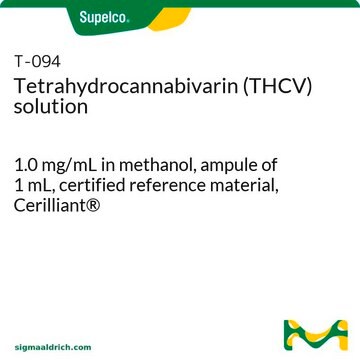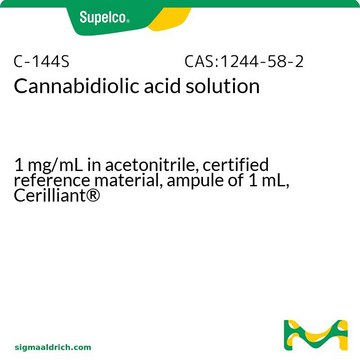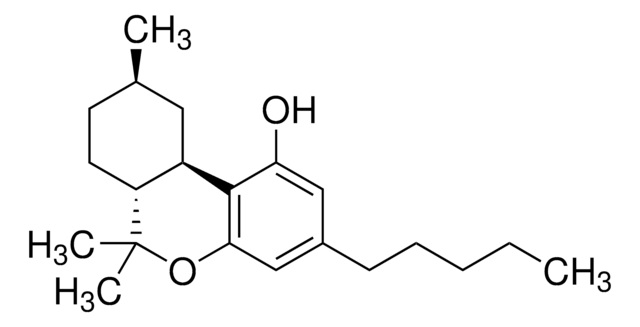39382
Δ9-Tetrahydrocannabinolic acid A
analytical standard
Synonym(s):
THCA-A
About This Item
Recommended Products
grade
analytical standard
Quality Level
Assay
≥97% (HPLC)
shelf life
limited shelf life, expiry date on the label
drug control
USDEA Schedule I; Home Office Schedule 1; regulated under CDSA - not available from Sigma-Aldrich Canada
technique(s)
HPLC: suitable
gas chromatography (GC): suitable
solid phase extraction (SPE): suitable
suitability
corresponds for H-NMR
application(s)
forensics and toxicology
pharmaceutical (small molecule)
veterinary
format
neat
storage temp.
−20°C
SMILES string
CCCCCc1cc2OC(C)(C)C3CCC(C)=CC3c2c(O)c1C(O)=O
InChI
1S/C22H30O4/c1-5-6-7-8-14-12-17-19(20(23)18(14)21(24)25)15-11-13(2)9-10-16(15)22(3,4)26-17/h11-12,15-16,23H,5-10H2,1-4H3,(H,24,25)/t15-,16-/m1/s1
InChI key
UCONUSSAWGCZMV-HZPDHXFCSA-N
Application
Storage Class Code
11 - Combustible Solids
WGK
WGK 3
Flash Point(F)
Not applicable
Flash Point(C)
Not applicable
Personal Protective Equipment
Regulatory Listings
Regulatory Listings are mainly provided for chemical products. Only limited information can be provided here for non-chemical products. No entry means none of the components are listed. It is the user’s obligation to ensure the safe and legal use of the product.
JAN Code
39382-VAR:
39382-10MG:
39382-BULK:
Choose from one of the most recent versions:
Already Own This Product?
Find documentation for the products that you have recently purchased in the Document Library.
Our team of scientists has experience in all areas of research including Life Science, Material Science, Chemical Synthesis, Chromatography, Analytical and many others.
Contact Technical Service







